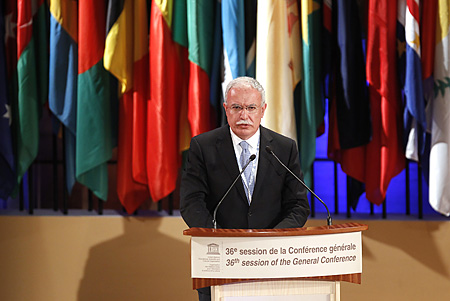
Palestinian Foreign Minister Riyad al-Malki delivers a speech during the 36th session of UNESCO's General Conference in Paris October 31, 2011. (Photo: Benoit Tessier / Reuters)
Unesco’s approval of full membership for Palestine is not without practical significance: The U.N. organization bestows and enforces the status of World Heritage Site, and with portions of the Heritage-aspirant Dead Sea located in Palestinian territory, as well as Bethlehem’s Church of the Nativity and the Hebron tomb of Abraham and his family, membership will give Palestinians more say in some of the most sensitive places on the planet.
But the main upshot, of course, is political. Monday’s lopsided 106-14 vote in Paris serves as a reminder of the enthusiasm most of the world feels for the Palestinian bid for full membership in the U.N. itself. That application is now pending before the U.N. Security Council, where the United States is threatening to use its veto — but really, really would rather not. In light of the Arab Spring and other perceptual challenges, Washington would much prefer that the Palestinians simply fail to muster the nine votes necessary to move the application forward at all. At least a couple of non-permanent Council members are on the fence, and the hope in Ramallah is that this gust from the Unesco vote — cheers went up in the assembly hall when the final tally was announced — might tip them their way.
(READ: Palestinian Authority takes statehood bid on the road.)
Nor was the vote painless. Welcoming Palestine to the United Nations Educational, Scientific and Cultural Organization may have meant saying goodbye to as much as 22 percent of the organization’s budget. A U.S. law passed in 199o obliges Washington to cut off funding to Unesco if it admits Palestine. The measure passed when both Unesco and the Palestinian leadership had lousy reputations among Americans. Times have changed: the U.S. is now the agency’s biggest contributor, and Palestinian Authority President Mahmoud Abbas is known in Washington as an advocate of non-violence and diplomacy.
Two weeks ago a pair of American diplomats were closeted in Abbas’ hotel bedroom, pleading with him not to put the Obama administration over a barrel with the Unesco application. Abbas was in Paris on a 10-day trip to drum up support for U.N. membership, and listened politely to U.S. envoy David Hale and Jerusalem Consul General Daniel Rubinstein. But the Unesco application went forward, with Palestinian leaders arguing that perhaps the difficulty lay not with their assertion of their rights but rather with a U.S. law specifically aimed at trying to deny them. And after the vote the U.S. ambassador to the organization, David T. Killion, sounded as though there may be a way to work around the new reality. Killion said the vote “will complicate our ability to support Unesco” and that Washington “remains deeply committed” to it.
Vote-counters will be studying the Paris balloting with an eye to New York, where the Security Council is expected to act in early November. In the Unesco hall, a whopping 52 nations abstained, including the United Kingdom, while France, another permanent member of the Security Council, voted to admit the Palestinians. No roll call was immediately available, but the swing votes among non-permanent Council members include Bosnia-Herzegovina, Portugal and Colombia.
The reaction from Israel, on whose behalf the U.S. is prepared to veto full Palestinian membership: “Unesco deals in science, not science fiction,” said Nimrod Barkan, the Israeli ambassador to the organization. “They forced on Unesco a political subject out of its competence.”
A possibly crucial technical point: The membership becomes effective only when Palestinians sign and ratify the Unesco constitution, something that presumably would be done by a sitting legislature. That’s something Palestine has lacked since Hamas took over the Gaza Strip, dividing Palestinian territories between that coastal enclave and the West Bank, where Abbas’ Fatah party rules. The two factions have agreed in principle to reconcile, however, and elections may produce a sitting Palestinian Legislative Council as early as January or February if Hamas accepts Abbas’ offer of going to elections sooner rather than later. The delay may also provide the loophole through which Washington could continue funding Unesco, at least for the time being.
Update: The State Department announced that it was immediately blocking a $60 million payment to Unesco scheduled for November. And the tally of Security Council members in the Unesco vote found nine voting for Palestine: France, Brazil, China, Russia, India, South Africa, Lebanon, Gabon and Nigeria. Abstaining were Portugal, Colombia, Bosnia-Herzegovina and the United Kingdom. Germany joined the United States in voting no.
MORE: Photos of Palestinians and Israelis clashing in the West Bank.

